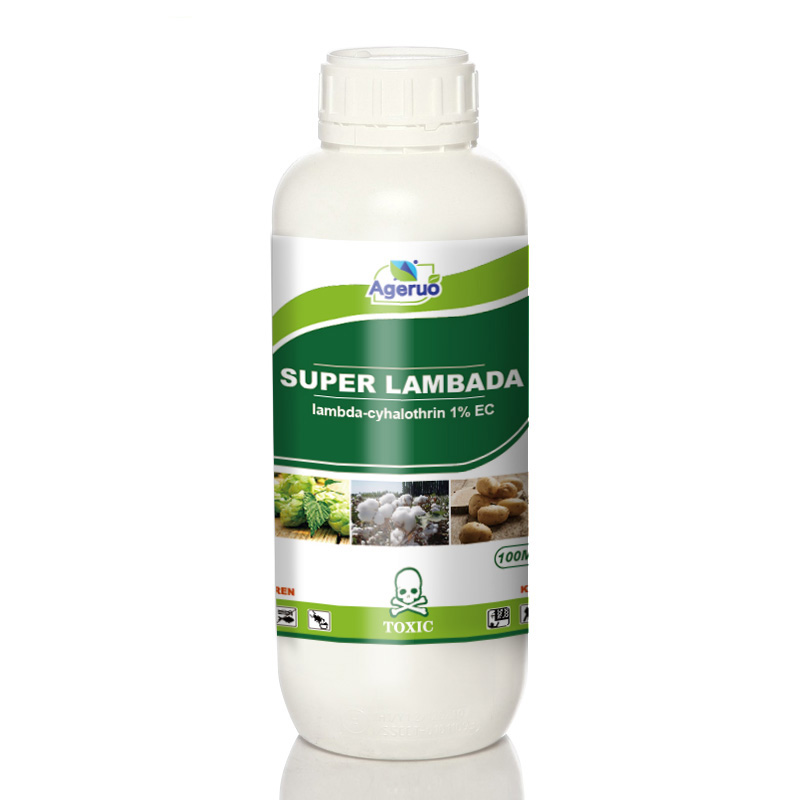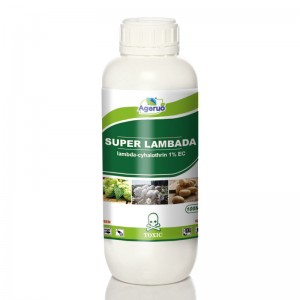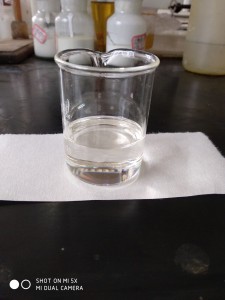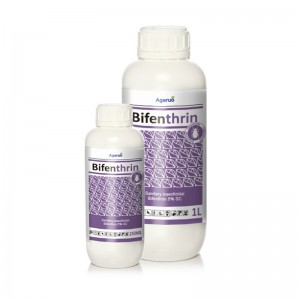Products
POMAIS Lambda-cyhalothrin 2.5%EC insecticide 50ml 100ml | Agrochemicals Cotton field kill bollworm
Introduction
| Active Ingredient | Thiamethoxam 2.5% EC |
| CAS Number | 153719-23-4 |
| Molecular Formula | C8H10ClN5O3S |
| Application | Systemic insecticide. For control of aphids, whiteflies, thrips, ricehoppers, ricebugs, mealybugs, white grubs and so on. |
| Brand Name | POMAIS |
| Shelf life | 2 Years |
| Purity | 2.5% EC |
| State | Liquid |
| Label | POMAIS or Customized |
| Formulations | 25% WDG,35% FS,70% WDG,75% WDG |
| The mixed formulation product |
Lambda-cyhalothrin 2% +Clothianidin 6% SC Lambda-cyhalothrin 9.4% + Thiamethoxam 12.6% SC Lambda-cyhalothrin 8% + Emamectin benzoate 2% SC Lambda-cyhalothrin 5% + Acetamiprid 20% EC Lambda-cyhalothrin 2.5% + Chlorpyrifos 47.5% EC |
Advantages
Lambda-cyhalothrin has several advantages:
High efficiency and broad spectrum
Strong killing effect on a wide range of pests, whether agricultural pests, horticultural pests or public health pests, can be effectively controlled.
Quick-acting and long-lasting
Rapid efficacy and long residual period can control the pest population in a short period of time and maintain the effect for a longer period of time, reducing the frequency of application.
Low toxicity and safety
Low toxicity to humans and animals, safe to use. Cyfluthrin is virtually harmless to humans and livestock at appropriate doses, and is suitable for use in a variety of environments.
Package

Mechanism of action of Lambda-cyhalothrin
Lambda-cyhalothrin belongs to the pyrethroid class of insecticides and works by interfering with the nervous system of insects. It affects insects in several ways:
Nerve conduction blockade
Lambda-cyhalothrin blocks signaling between the neurons of the insect, causing it to be unable to move and feed properly. This mechanism causes the insect to rapidly lose its mobility upon exposure to the agent and thus die.
Sodium channel modulation
The compound affects the sodium ion channels in the membrane of the insect's nerve cells, causing them to become overly agitated, which ultimately leads to the death of the insect. Sodium channels are an important part of nerve conduction, and by interfering with their normal function, Lambda-cyhalothrin causes loss of control of the insect's nervous system.
Areas of application
Lambda-cyhalothrin is widely used in the following fields:
Agriculture
In agriculture, Lambda-cyhalothrin is widely used to control various crop pests such as aphids, whiteflies and leafhoppers. It can effectively protect crops and improve yield and quality.
Horticulture
Lambda-cyhalothrin also plays an important role in horticultural crops, such as flowers, fruit trees and vegetables, which can be protected from pests by using Lambda-cyhalothrin to ensure the healthy growth of plants.
Public Health
Lambda-cyhalothrin is also used to kill mosquitoes, flies and other public health pests, reducing the risk of disease transmission. This is particularly important in urban environments and public places to effectively control vector insect populations and protect public health.
Suitable crops:
Lambda-cyhalothrin is suitable for use on a wide range of crops, including cotton, fruit trees, vegetables, tea trees, tobacco, potatoes and ornamentals. These crops are often susceptible to a variety of pests, and Lambda-cyhalothrin is effective in controlling these pests and protecting healthy crops.

Act on these Pests:

Vegetable Pests
Vegetable greenfly
Vegetable greenfly is a common pest in vegetable crops, especially cruciferous vegetables. Use 25g/L Lambda-cyhalothrin emulsifiable concentrate 7.515g/hm² in water and spray evenly, or use 2.5% Lambda-cyhalothrin emulsifiable concentrate 7.515g/hm² in water and spray evenly, it can effectively control vegetable greenfly.
Aphids
Aphids are extremely harmful to vegetables, sucking plant sap and causing poor plant growth. Use 25g/L Lambda-cyhalothrin emulsifiable concentrate 5.625~7.5g/hm² to water and spray evenly, which can effectively kill aphids.
American spotted fly
American spotted fly will leave obvious marks on the leaves, affecting the photosynthesis of plants.2.5% Lambda-cyhalothrin emulsifiable concentrate 15~18.75g/hm² in water and spray evenly, can effectively control American spotted fly.
Cotton pests
Cotton bollworm
Cotton bollworm is an important pest of cotton, which can seriously affect cotton yield. Use 25g/L Lambda-cyhalothrin emulsifiable concentrate 15~22.5g/hm² to water and spray evenly, which can effectively control bollworm.
Fruit Tree Pests
Peach heartworm
Peach heartworm will attack fruit trees and cause fruit rot. Use 25g/L Lambda-cyhalothrin emulsifiable concentrate 6.258.33mg/kg in water and spray evenly, or use 2.5% Lambda-cyhalothrin emulsifiable concentrate 56.3mg/kg in water and spray evenly, which can effectively prevent and control peach heartworm.
Tea Tree Pests
Tea leafhopper
Tea leafhopper will suck the sap of tea tree, affecting the quality of tea. Use 2.5% Lambda-cyhalothrin emulsion 15~30g/hm² to water and spray evenly, which can effectively prevent and control tea leafhopper.
Oilseed and cash crop pests
Tobacco greenfly
Tobacco greenfly can cause serious damage to tobacco and oilseed crops. Use 25g/L Lambda-cyhalothrin emulsifiable concentrate 7.5~9.375g/hm² to water and spray evenly, it can effectively prevent and control tobacco leafminer.
Using Method
When using Lambda-cyhalothrin, the appropriate application method should be selected on a case-by-case basis:
Spray method
Lambda-cyhalothrin is made into a solution and sprayed evenly over the plant surface. This method is simple and effective and is suitable for crop control over large areas.
Dipping method
Plant roots are dipped in the solution so that the agent is absorbed through the roots. This method is suitable for some specific crops and pest control.
Smoke method
The agent is heated to form smoke which is diffused into the air to kill flying insects. This method is suitable for controlling flying pests such as mosquitoes and flies.
| Formulation | Plant | Disease | Usage | Method |
| 25%WDG | Wheat | Rice Fulgorid | 2-4g/ha | Spray |
| Dragon Fruit | Coccid | 4000-5000dl | Spray | |
| Luffa | Leaf Miner | 20-30g/ha | Spray | |
| Cole | Aphid | 6-8g/ha | Spray | |
| Wheat | Aphid | 8-10g/ha | Spray | |
| Tobacco | Aphid | 8-10g/ha | Spray | |
| Shallot | Thrips | 80-100ml/ha | Spray | |
| Winter Jujube | Bug | 4000-5000dl | Spray | |
| Leek | Maggot | 3-4g/ha | Spray | |
| 75%WDG | Cucumber | Aphid | 5-6g/ha | Spray |
| 350g/lFS | Rice | Thrips | 200-400g/100KG | Seed Pelleting |
| Corn | Rice Planthopper | 400-600ml/100KG | Seed Pelleting | |
| Wheat | Wire Worm | 300-440ml/100KG | Seed Pelleting | |
| Corn | Aphid | 400-600ml/100KG | Seed Pelleting |
Lambda-cyhalothrin vs bifenthrin
Lambda-cyhalothrin and bifenthrin are both pyrethroid insecticides, but they have different chemical structures and application effects. Below are some of their major differences:
Chemical structure: Lambda-cyhalothrin has a more complex molecular structure, while bifenthrin is relatively simple.
Insecticidal spectrum: Lambda-cyhalothrin has a strong killing effect on a wide range of pests, including aphids, leafhoppers and lepidopteran pests, etc. bifenthrin, on the other hand, is mainly used for the control of flying insect pests, such as mosquitoes, flies and aphids.
Residual period: Lambda-cyhalothrin has a long residual period and can remain active in the environment for a long time, while bifenthrin has a relatively short residual period but has a faster insecticidal effect.
Safety: Both have low toxicity to humans and animals, but safety measures should be taken to avoid overdose and misuse.
Lambda-cyhalothrin vs Permethrin
Lambda-cyhalothrin and Permethrin are both pyrethroid insecticides, but they differ in application and effect:
Insecticide Spectrum: Lambda-cyhalothrin has a broad-spectrum killing effect on a wide range of pests, while Permethrin is mainly used to control flying insect pests such as mosquitoes, flies and aphids.
Residual period: Lambda-cyhalothrin has a long residual period and remains active in the environment for a long time, while Permethrin has a shorter residual period but has a faster killing effect.
Applications: Lambda-cyhalothrin is widely used in agriculture and horticulture, while Permethrin is commonly used in areas such as home hygiene and pet protection.
Toxicity: Both have low toxicity to humans and animals, but safety precautions should be taken to avoid overdose and misuse.
Insecticidal effect of Lambda-cyhalothrin
Does Lambda-cyhalothrin kill bed bugs?
Yes, Lambda-cyhalothrin is effective in killing bed bugs. It does this by interfering with the bed bug's nervous system, causing it to lose its ability to move and feed, which ultimately leads to death.
Does Lambda-cyhalothrin kill bees?
Lambda-cyhalothrin is toxic to bees and is capable of killing them. Therefore, when using Lambda-cyhalothrin, avoid applying in areas where bees are active to protect beneficial insects such as bees.
Does Lambda-cyhalothrin kill fleas?
Yes, Lambda-cyhalothrin is effective in killing fleas. It does this by interfering with the flea's nervous system, causing it to lose its ability to move and feed, ultimately leading to death.
Does Lambda-cyhalothrin kill mosquitoes?
Yes, Lambda-cyhalothrin is effective in killing mosquitoes. It does this by interfering with the mosquito's nervous system, causing it to lose its ability to move and feed, ultimately leading to death.
Does Lambda-cyhalothrin kill termites?
Yes, Lambda-cyhalothrin is effective in killing termites. It does so by interfering with the termite's nervous system, causing it to lose its ability to move and feed, which ultimately leads to death.
Lambda-cyhalothrin is used to control lawn borer
Lambda-cyhalothrin can effectively control the grass borer. It interferes with the grass borer's nervous system, causing it to lose its ability to move and feed, and ultimately leading to death.
Lambda-cyhalothrin for locust control
Lambda-cyhalothrin is effective against locusts. It interferes with the locust's nervous system, causing it to lose its ability to move and feed, which eventually leads to death.
FAQ
Is cyfluthrin harmful to the environment?
Cypermethrin has a low impact on the environment when used in appropriate amounts, but excessive use may affect non-target organisms, and directions for use should be followed.
Can cyfluthrin be mixed with other pesticides?
Yes, but it is recommended to conduct a small-scale test before mixing to avoid interactions between agents affecting the effect.
What should I pay attention to when using cypermethrin?
Protective equipment should be worn during application to avoid direct contact with skin and eyes. Wash hands after application and avoid prolonged stay in the application area.
Can cypermethrin be used in organic farming?
Cypermethrin is not suitable for use in organic farming because it is a chemically synthesized pesticide and organic farming requires the use of natural or certified inorganic pesticides.
What are the storage conditions for cyfluthrin?
It should be stored in a cool, dry and well-ventilated place, avoiding direct sunlight and high temperature to maintain efficacy and safety.
Are you a factory?
We could supply insecticides, fungicides, herbicides, plant growth regulators etc. Not only we have our own manufacture factory ,but also have long-term cooperated factories.
Could you provide some free sample?
Most samples of less than 100g can be provided for free, but will add extra cost and shipping cost by courier.
Why Choose US
We supply varies of products with design,production,exporting and one stop service.
OEM production can be provided based on customers’ needs.
We cooperate with customers all over the world, ans provide pesticide registration support.













